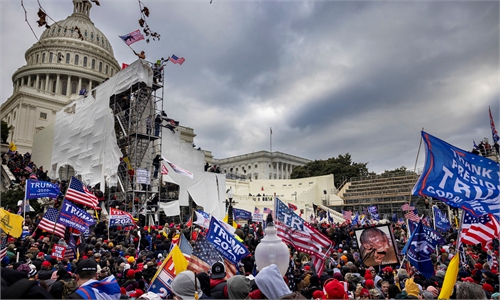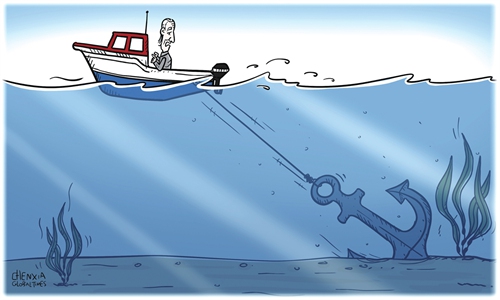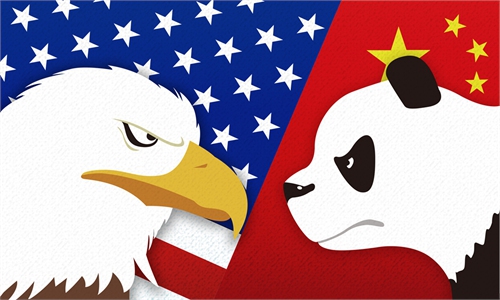Biden on year one: disappointments in fighting COVID-19, healing divided society, fixing diplomacy and boosting economy
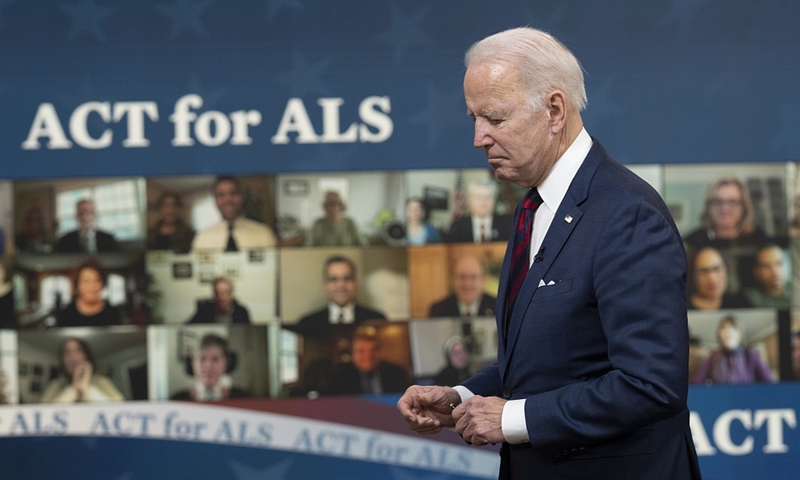
US President Joe Biden Photo: VCG
One year ago, when Joe Biden became the new US president, many Americans and US allies, as well as the "competitors" or "rivals" in the eyes of US politicians like China and Russia, hoped his administration could fix the problems that his predecessor Donald Trump had left the US and the world.
But now, most of them found that Biden's performance is disappointing as well.
Biden is not a young and energetic leader, and his image is old and slow, and it seems that his political experience did help him a lot in overcoming challenges, and although he wants to fix some mistakes in fields like handling COVID-19 pandemic, the systemic problem of US democracy - endless partisan struggle - has chained him from making meaningful changes, and an effective political reform to fix this systemic problem is almost a "mission impossible" for any US president, said experts.
On foreign affairs, Biden did make some changes such as the return to the Paris Agreement and to some extent the strengthened US ties with its allies. But the hasty pullout from Afghanistan has seriously damaged the image and credibility of the US, especially among countries that expected the US protection, analysts noted. They said that US tensions with China and Russia remain unchanged, and even getting more intense on the Ukraine issue and the Taiwan question.
To cure the illness of the US is not about changing presidents, it requires an in-depth political reform, and most observers believe that the Democrats might lose the midterm election this year, and the Biden administration could become a "lame duck" after the failure, and this would make China-US ties even more uncertain and complicated.
Systemic problem
On domestic affairs, Biden has some accomplishments, such as the passage of a $1.9 trillion coronavirus relief package and a $1.2 trillion bipartisan infrastructure deal, but other challenges have overshadowed those feats: Perhaps most significantly, the fact that the COVID-19 pandemic has not subsided, ABC News reported.
Biden's first-year average approval rating was 48.9 percent, according to Gallup, which ranked lower than many other US presidents but remained higher than Trump.
The main reason is that the US now faces a comprehensive general crisis. Even if Biden wants to do something, the Republicans will tie his hands up, Li Haidong, a professor at the Institute of International Relations of the China Foreign Affairs University, told the Global Times on Wednesday.
The US economy is also fragile to support Biden's ambitions. The hollowing out of the economy and the long-existing insurmountable problems of the gaps between the rich and the poor are not something Biden can solve, Li said.
Americans feel worse about the pandemic and the economy than they did earlier in Biden's term, and his ratings have suffered for it… they do not exclusively blame his policies, but they do demand more attention to inflation, said a report by CBS News on Sunday.
Inflation is like "quenching thirst with poison" and the whole US economic system is relying on the easing of monetary policy amid the pandemic, and the problem is likely to cause another financial crisis, said some analysts.
On handling the pandemic, "the epidemic control and prevention has been politicized in the US," said Diao Damin, an associate professor at Renmin University of China. He noted that both Trump and Biden suffered from the similar problem during their terms, and "Biden's logic of epidemic prevention is still driven by political factors, not entirely following scientific logic."
"For instance, as the epidemic situation remains uncontrolled, in order to please the public and serve political demands rather than prioritize people's lives and public health, Biden decided to reopen US borders in September 2021, and this has caused the high increase of cases," Diao remarked.
Apart from fighting the pandemic and boosting the economy, Biden has also failed to "heal" or reunite a divided US society, said experts, because both Democrats and Republicans are benefiting from or relying on such a divided and polarized situation, and they want to maximize their political interests.
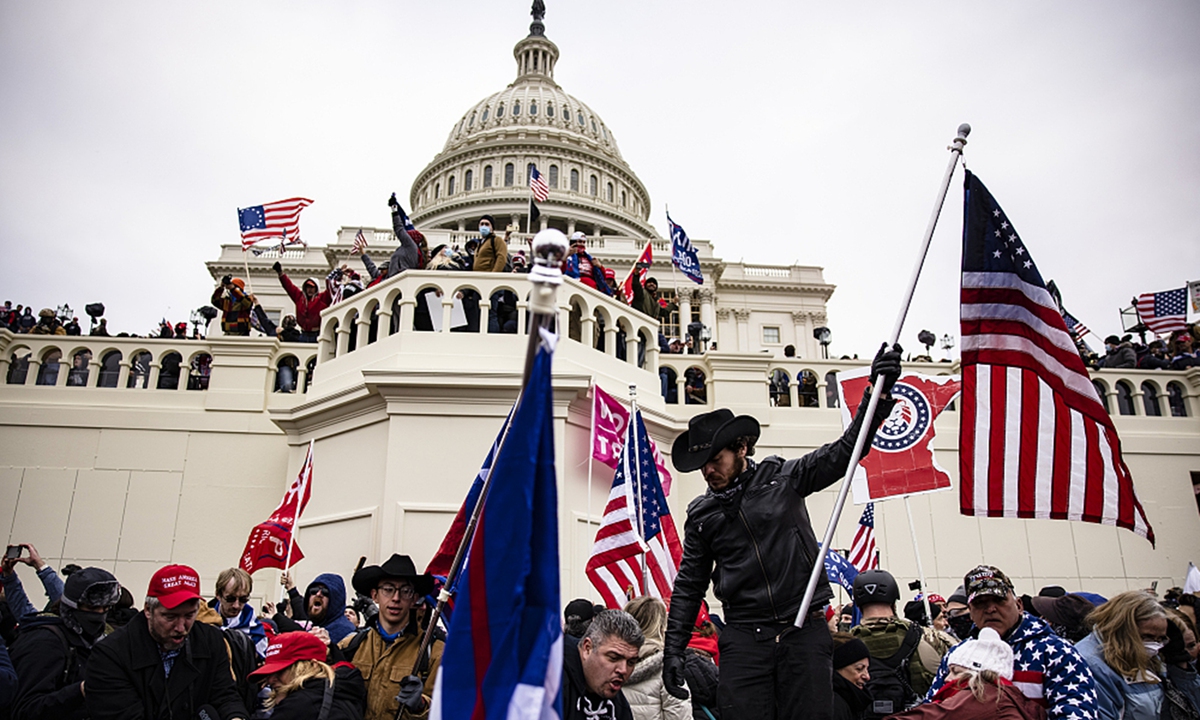
Pro-Trump supporters storm the US Capitol following a rally with President Donald Trump on January 6, 2021 in Washington, DC. Trump supporters gathered in the nation's capital to protest the ratification of President-elect Joe Biden's Electoral College victory over President Trump in the 2020 election. Photo: Samuel Corum/Getty Images/VCG
Foreign affairs
The hasty pullout of US soldiers from Afghanistan is the symbol of Biden's failing diplomacy, said many observers, as the US has showed that it's reluctant to keep its military presence and it doesn't want to be responsible for the mess it has created.
The US has strengthened its alliance system to contain both China and Russia. But the AUKUS nuclear submarine deal that the US teamed up with the UK and Australia has caused great concern of an arms race and nuclear proliferation in the region, and this has made the world less secure and added more uncertainty, said analysts, noting that tensions on the Ukraine issue between the US-led NATO and Russia just proves that Biden's slogan "America is back" is "back to making things more complicated."
On China-US ties, Chinese scholars said at a forum the China Institute of International Studies (CIIS) organized on Tuesday that "according to the diplomatic activities done by the Biden administration in the past year, it basically inherits the Trump administration's China policy, but at the same time, China and the US are also seeking a new paradigm of mutual respect and having exchanges based on equality."
Intergovernmental communication and people-to-people exchanges have been restored, and China-US ties have been improved a little bit compared to the situation during Trump's term, said the CIIS website.
But most major problems remained unsolved, such as unfair economic sanctions against Chinese firms, and the US is also using the island of Taiwan to contain the Chinese mainland, said experts. They held that after the China-US meeting in Anchorage, Alaska earlier last year, China has had more confidence in shaping future bilateral ties with a straighter attitude.
After the midterm
In the 2022 midterm, the Democrats will be influenced by Biden's poor performance. Moreover, there is a so-called pendulum effect in midterm elections, which means that when the president wins, the party usually loses seats in the midterm elections, Diao said.
There is a good chance that the midterm elections will be extremely negative for Democrats, which could put pressure on Biden for the last two years of his presidency, he noted.
Jin Canrong, associate dean of the School of International Studies at the Renmin University of China, said that becoming a "lame duck" is not good news for the Biden administration and for China-US ties, because Biden could focus more on foreign affairs and he would like to be more aggressive rather than pragmatic to deal with US' "competitors."
But other observers believe that Biden would like to have a diplomatic legacy for the rest of his term on climate issue or fighting the pandemic, and he needs China's support, so the future of China-US ties would be complicated and uncertain.

One year ago, when Joe Biden became the new US president, many Americans, US allies and even China and Russia, hoped his administration could fix the problems left by Donald Trump. But now, most of them found Biden’s performance disappointing.

